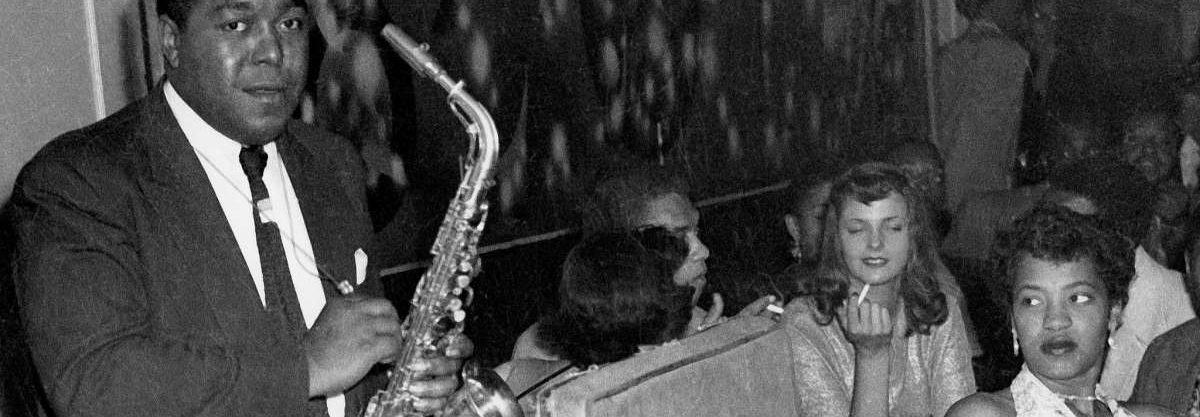
Parkeology 002: Everything Goes Wrong
His only real bad nights were when he overindulged – Earl Hines
Every saxophone player knows from bitter experience that the G sharp key is inclined to stick closed, and must be pried open by hand.
Here’s a recording of Ornithology from Christmas Eve, 1949. This is the opening number, and Bird realizes in the first bar that his G sharp key is stuck. There’s a slight pause as he pries it open, then he continues on to play flawlessly, this minor glitch forgotten.
In his Bird biography, Chuck Haddix relates a story that must have come from Norman Granz, about a performance at Jazz at the Philharmonic on November 22nd, 1948. At the time Haddix was writing, no recordings of this performance were thought to exist. But they surfaced in 2021, and were released on Bird in LA. You will find the complete Ornithology track below.
The story goes something like this:
Bird is on a JATP tour that makes a stop at Shrine Auditorium, in Los Angeles. Granz knows the city holds many temptations for Bird, and hires a private detective to prevent Bird from disappearing. Bird vanishes anyway. Granz knows he will have to issue refunds if Bird doesn’t show up for the concert, causing him much consternation, and he sends out a search party. Toward the end of the performance, while Coleman Hawkins is stranded onstage, stalling for time, Bird shows up, quite drunk. Granz chews him out, runs cold water over his head to sober him up, and more or less pushes him onstage from the wings.
There’s a silver lining to Bird’s alcohol use: it brings out his vulnerable side. He’s a bit tipsy at times on the 1948-49 Royal Roost broadcasts, and his playing is heartfelt, impaired motor skills notwithstanding. Here are the wistful last eight bars of his solo on East Of The Sun:
So it’s a sincere and somewhat chastened Bird who finds himself onstage at the Shrine, as a rowdy JATP crowd cheers his arrival and Al Haig sets up Ornithology with an 8 bar intro.
Bird launches into the theme and the first thing to go wrong, of course, is that his G sharp key is stuck. In this instance, though, it’s only the beginning of his troubles. He unsticks it, but doesn’t return to the theme, following a simple downward sequence instead. He immediately discovers that his fingers have lost their precision and his articulation has gone awry. At the same time, his reed isn’t cooperating. Its muffled yet chirpy sound suggests that it’s positioned haphazardly on the mouthpiece. All this in the first five seconds.
He returns to the theme in the second half, bailing on the final phrase (too risky?) and leaning on a single note, steadying himself for the second chorus.
He tries to make a fresh start and manages to cobble together some interesting lines, but he can’t overcome his faulty execution. He pauses for a couple of bars, possibly to adjust his reed, but no improvement can be detected when he resumes.
He struggles through to the end of the second chorus, coming to rest again on a single note. It’s at this point that he makes a joke at his own expense, quoting The Man On The Flying Trapeze (“He floats through the air with the greatest of ease.”) This gets a laugh from the crowd, some of whom must have understood his predicament.
He begins his third chorus optimistically, but even his most familiar turns of phrase elude his fingers, one after another. Approaching the end of the chorus, he can see there’s no use in going on. He bows out with another joke, quoting Show Me The Way To Go Home (“Show me the way to go home / I’m tired and I want to go to bed / I had a little drink about an hour ago / And it’s gone right to my head”).
This inconclusive closing phrase trails over into the beginning of the next chorus, creating the expectation that Bird will continue. When he doesn’t, it produces a momentary vacuum. As Al Haig switches from comping to soloing, the crowd reacts with a mix of laughter and applause, along with possible cat calls.
Is there any moral to this story? If so, it’s about Bird’s integrity as an artist.
Despite his intoxication, he is fully engaged in the creative process, using whatever skills he can salvage to tell an honest story, one that acknowledges he has ended up drunk onstage at JATP. It’s a good faith effort to create a meaningful statement for his listeners, fashioned from his thoughts in that moment.
That’s what Bird did every time he picked up his horn. In a sense, then, everything went right.
Here’s the full Ornithology track:
Next time: Plucked from the Atmosphere
